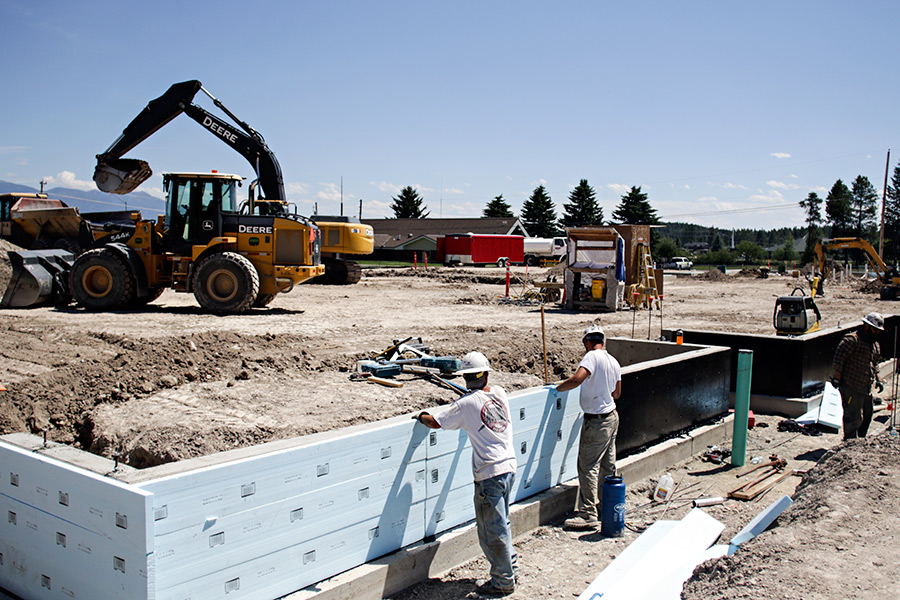Construction is once again a booming industry in the Flathead, with project valuations easily topping previous years and many contractors booked out into the summer.
But as the valley enjoys a nice rebound after waiting through the slow years of the recession — Kalispell alone saw $129 million worth of construction 2016 — one problem continues to consistently plague construction companies: finding enough labor to complete projects.
While local construction companies say their core crews of skilled workers tend to stay intact, the less-skilled positions for general labor — meaning jobs such as carpenter’s assistants or those handling materials or cleanup — are almost impossible to fill.
“From the skilled side, we’re actually in pretty good shape, but from the labor side, we have seen a shortage,” said Travis Denman, partner at Denman Construction in Whitefish. “But on the labor side, we’ll take whoever, basically. If you’re willing to show up and actually stay a whole day and not complain too much, we’ll take you.”
Denman said his company has had trouble finding consistent labor for the many projects they have lined up heading into spring. Likewise, Marie Costanzo, office manager at Ron Terry Construction Inc. in Kalispell, said the employees the company does have tend to stick around, but if someone leaves, backfilling that position is difficult.
Ron Terry Construction has house foundations scheduled into April, she said, but the company is still struggling to find a full roster of workers.
“We don’t really have trouble hanging onto our employees, but when we do lose one it takes forever to replace them,” Costanzo said. “There’s just not enough people to fill positions.”
Costanzo, like many other construction companies in the valley, has turned to employee staffing services for help. She said she was told that her company should try raising the offered wage to make it a more competitive offer. The company increased the wages and did see a result, Costanzo said, but hiring is still an issue.
Janie Hunter, branch manager at LC Staffing in Kalispell, said there’s a clear deficit of skilled tradesmen and women across the board, and LC Staffing is encouraging the construction companies to treat this year like a rebuilding year for a sports team: Hire on younger, less-skilled employees and mentor them into your dream crew.
“The solution that we’ve been working with our clients is considering hiring someone with less skill and investing time and training in them so they become that loyal employee you are seeking,” Hunter said.
According to the U.S. Bureau of Labor Statistics, construction across the country is expected to add 790,400 jobs by 2024, and is in the top five industries projected to grow the most between now and 2024. The state unemployment rate sat at 4 percent in December, and Flathead County’s unemployment was 5.9 percent.
Trevor Gonser, employment services supervisor with the Kalispell Job Service, said construction is expected to play an even larger role in the Flathead in the next decade, ranking No. 2 among the most-in-demand occupations, behind the No. 1 hospitality industry.
As of last week, the Job Service had at least 575 open jobs across the county in all industries, Gonser said. That doesn’t include the 261 jobs open at Kalispell Regional Healthcare, he said.
“There are at least probably 1,000 jobs available right now,” Gonser said. “The pendulum has kind of swung back into the worker’s favor compared to where it was during the recession.”
Montana’s aging Baby Boomer population retirements are outpacing the next generation of workers, he said, which plays a key role in a workforce shortage.
“You just don’t have enough youth coming up to replace all those workers,” he said.
The state Legislature is churning out at least one possible solution for employers this year. Rep. Casey Schreiner, D-Helena, is sponsoring House Bill 308, which would create a $1,000 tax credit for employers if they hire an apprentice, and a $2,000 tax credit if the apprentice is also a veteran. The tax credit wouldn’t be available to the employer for six months or until the apprentice has completed training, whichever comes first.
The bill had a hearing in the House Taxation Committee on Feb. 7, during which construction company owners said they weren’t able to bid on projects because they just didn’t have the staff.
Denman said his crews have already started mentoring a couple of strong candidates who don’t have much of a background in construction but have a good personality for the team and want to learn.
“It’s really that simple,” Denman said.
